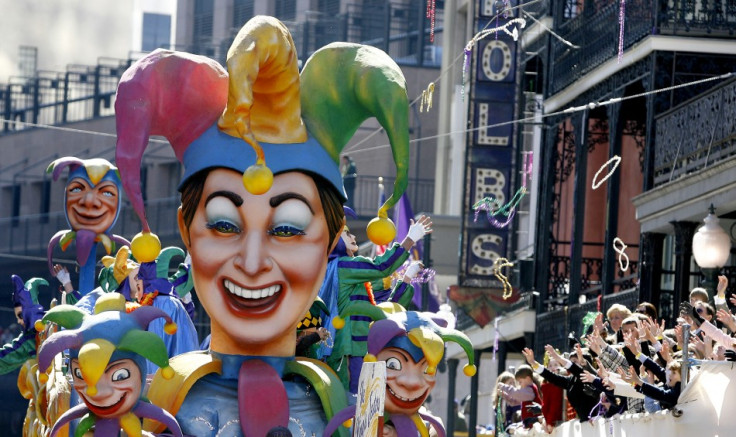Mardi Gras 2014: Fat Tuesday Origin, Traditions and Celebrations Around the World

Mardi Gras 2014 has officially begun with the traditional feast day known as "Fat Tuesday" falling on 4 March.
The annual Christian holiday commemorates the traditional feast day before the start of Lent season on Ash Wednesday. Lent is a 40-day period observed with abstinence leading to Easter Sunday.
Mardi Gars has its origin in medieval Europe, predominantly Rome. The festivity eventually spread to France and across Europe and then to the America by the late eighteenth century.
Mardi Gras traditions
Wearing a mask is a must for float riders in New Orleans, especially on Fat Tuesday. In medieval times during European festivals, masks allowed people to mingle irrespective of social class. Within the context of New Orleans, the cover of a mask would dissolve racial differences during the carnival.
Dazzling gaslight torches, or flambeaux, were intended to show light to night revellers. In modern times, the torch light adds to the glitz of performances in parade.
In yet another tradition, krewes, the groups that organise Mardi Gras parades, throw trinkets to the crowd lining the streets. According to official website of New Orleans' Mardi Gras, the tradition of float riders throwing trinkets to the crowds began in the 1870s. The gifts included beads, cups, doubloons and stuffed animals.
Mardi Gras around the world
Mardi Gras is celebrated across the world, particularly in places with a large Roman Catholic population.
The United Kingdom does not specifically name the traditional feast day before Lent Mardi Gras, but the day is celebrated as Pancake Day, or Shrove Tuesday.
New Orleans Mardi Gras carnival is an official holiday which kick starts the famous two-week festival featuring parades leading a flotilla of floats.
The tradition takes place in a number of other cities such as the St. Louis Mardi Gras, regarded as the second largest in the US after New Orleans.
In Sydney, Mardi Gras is linked with annual lesbian, gay, bisexual, and transgender (LGBT) pride parades on its Oxford Street. The celebrations began on 28 February this year.
The carnival celebrations have a strong hold on Rhineland where it includes dancing, parades, heavy drinking and public displays with floats.
In Germany, Mardi Gras is referred to as Rosenmontag (Rose Monday). This year it fell on 3 March.
The Rose Monday parades in Cologne, Mainz and Dusseldorf are the highlights of the German street carnival season. The festival marks the beginning of Lent and is celebrated in most of the Dutch-speaking countries of Europe.
© Copyright IBTimes 2025. All rights reserved.




















